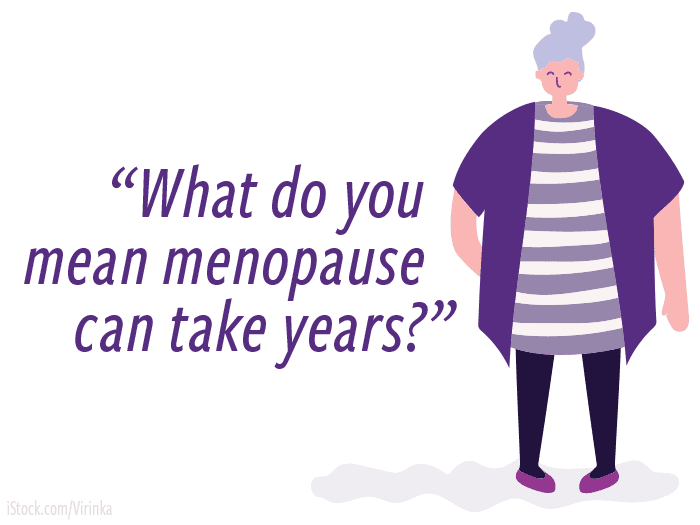Menopause: It’s a dreaded word for some women and a relief for others. The first group deems it as an ending of reproduction and—more upsettingly—youth. For the others, it’s a relief from some of the continuing side effects of menstruation: cramping, migraines and back pain. Whatever your take on it, if you are a woman, it will happen. Let’s work to embrace it, understand it, and prevent some of the negative connotations and symptoms that occur with it.
What are the stages of menopause?
To start, let’s define the words and the process: A healthy woman is premenopausal when she is having regular periods. Perimenopause is the time when a woman experiences the initial reduction in ovarian function, which may be noticeable by changes in the menstrual cycle. During perimenopause, menses can vary to be shorter or longer and become less or more frequent. The transition from perimenopause can take several years, but the average age of menopause starts around age 52, although some women start as early as age 40. A woman is considered in menopause when she has gone a year without a period.

Menopause is a normal part of the aging process. It begins with a gradual reduction of estrogen, a hormone produced by the ovaries. Although menopause is normal, the loss of estrogen in the body can cause many changes in the body systems, and may lead to some pathological conditions. Postmenopause—the years after menopause—may be as long as or even longer than a woman’s reproductive years, so it’s important we embrace these changes to our bodies positively.
Menopause can also occur suddenly if a woman has her ovaries surgically removed. Because surgical menopause is sudden, estrogen levels decline more quickly and some of the complaints of menopause, such as hot flashes, sleep disturbances, mental confusion, and poor temperature regulation may be more severe.
What are the symptoms of menopause?
Most of us, even if we haven’t gone through it ourselves, have heard our mothers, sisters, or friends complain about the symptoms and signs of menopause. Certain women go through menopause unaffected, while others have intolerable symptoms; hot flashes, fatigue, insomnia, heavy menstruation and brain fog are some of the complaints. Some may be annoying and amusing, like when one of my friends went outside in 20-degree weather and opened her blouse to cool down; others can lead to more serious effects, like lack of sleep and irritability that might cause relationships to deteriorate or work productivity to suffer. Sexual arousal and desire are often affected by menopause as well, so it’s important to address the changes head-on.

The symptoms of menopause transition—primarily hot flashes—usually start about two years before the final menstrual period, but can, for some women, continue on longer. Treatment options for menopause transition can vary, but if you start experiencing shorter periods, a longer timeframe between periods, or any changes in your menstruation cycle, make an appointment with your gynecologist or primary care provider. They will talk you through the changes you’re experiencing, what will occur in the future, and, if menopause symptoms are intolerable, the possible treatment options for this time in your life.
What can you do to manage symptoms of menopause?
Lifestyle changes such as avoiding hot environments, maintaining a healthy body weight, abstinence from smoking, getting regular exercise, and practicing relaxation techniques are all self-management approaches that can help you control menopausal symptoms. Alternative treatments—like soy, isoflavone supplements, black cohosh, vitamin E and omega-3 fatty acids—are low risk options as well, but their efficacy may be similar to placebo. Some women have found relief with bioidentical hormones created by custom compounding pharmacies. The North American Menopause Society does not support the use of bioidentical hormones secondary to the lack of regulation and rigorous safety and efficacy testing. Whether you choose medical care or alternative treatments, tell your primary care provider and/or gynecologist. Your primary care provider should know your alternative medicine choices particularly if you have other medical problems.
If you look at the bodily changes and pathologies that occur due to a woman’s decrease in estrogen, our first response could be, “Give me back my estrogen!” Biomedical hormone replacement therapy (BHRT) is one treatment for severe menopausal transition symptoms, but consultation with your physician is imperative since it is not appropriate for everyone. BHRT is only used for short term symptoms, so your estrogen levels will eventually taper out.
Ladies, it’s time for us to accept what will be happening to all of us. That is our power. As women, we are all going to go through this phase of life. Use your women’s network for support, information, and laughter during the sometimes frustrating but often humorous things that occur as we age. In following blog posts, I will be writing about some of the bodily changes that happen after menopause and tips to assist with negotiating all parts of the menopause experience. Stay tuned!!
Special thanks to April Vargus, PA for her expertise and assistance with this blog post.
Our exceptional physical therapists at the Des Moines University Clinic are here to help you thrive before, during, and after menopause. For more information, to sign up for exercise classes and special programs, or to make an appointment, visit the DMU Clinic website or call 515-271-1717.
